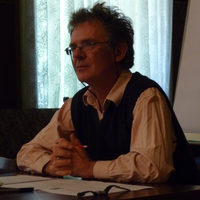Papers by Florian Mussgnug
Chapter 6 - 1994
Modern Humanities Research Association eBooks, Jun 16, 2024
Chapter 5 - 1972
Modern Humanities Research Association eBooks, Jun 16, 2024
Part II Theorizing (Postmodern) Impegno
Postmodern Impegno - Impegno postmoderno
Notes on Contributors 327
Peter Lang eBooks, Sep 1, 2016
Part III Genres of Impegno
Speculazioni ecologiche: impegno e retrotopia nel romanzo italiano contemporaneo
Narrativa, Dec 1, 2021
Centuria - One hundred ouroboric novels
Marina Warner "Stranger Magic" (Review)

Opposing Fascism: Community, Authority and Resistance in Europe
Italian Studies, 2000
Opposing Fascism: Community, Authority and Resistance in Europe. Ed. by Tim Kirk and Anthony McEl... more Opposing Fascism: Community, Authority and Resistance in Europe. Ed. by Tim Kirk and Anthony McElligott. Cambridge: Cambridge University Press, 1999. x + 246 pp. £35. ISBN ° 521 48309 3· Fascism, it seems, is becoming less popular. Not only have a number of recent studies rightly stressed the limits to the political appeal of the extreme right in inter-war Europe, but the energies of historians seem finally to be moving away from yet more monographs on particular fascist movements towards more broadly based studies of the political, social, and, more especially, economic conditions which caused the extreme right to flourish in certain milieus while emphatically failing in others. This salutary trend away from 'fascist studies' is well exemplified and vindicated by this stimulating collection of essays. Readers should not be misled by the title: despite its origins in a History Workshop conference in 1992, there is little here about anti-fascism, traditionally defined. Its concern, as presented by the editors in the Introduction, is to locate resistance to the extreme right in the 'real communal solidarities beneath the level of the nation' (pp. 4-5). As such, it is concerned primarily not with the formal panoply of national, political, or ideological resistance to fascism but with the dynamics within communities which led particular social groups, urban neighbourhoods, or rural villages to reject implicitly or explicitly the oppressive forms of authority represented by fascism. This is a brave ambition, and it does not negate the value of the book that, taken as a whole, its component essays largely fail to engage with the issues which it raises. Part of the difficulty lies with the editors' opening manifesto, which through its use of the amorphous term 'community' as the location of what Kirk and McElligott nearly but don't quite call 'real resistance' to fascism presents unavoidable problems of definition. The difficulties of imposing a logic of resistance on diverse and often ambivalent acts of dissidence or disobedience has, of course, long been a commonplace in the historiography of Europe in the 1930S and 1940s; but, as the editors readily admit, community is also an 'elusive concept' (p. 4) which risks glossing over the fault-lines of internal division while presenting fascism as an alien force which emerged outside of the community. In reality, of course, things were rarely so simple. Communities tend to appear more real and more united in the retrospective vision of historians than they did to participants at the time, and support for fascism, just as much as rejection of it, was incubated within local communities. Above all, the notion, implicitly proposed by the editors, of a dialectic between fascism and community threatens to obscure the pivotal role played by the national and local institutions of the state which, as a number of the contributions to this volume clearly demonstrate, often influenced either positively or negatively a community's response to fascism. In truth, these conceptual problems matter much less than the quality of the essays contained within the volume. Its virtues are plural rather than single and at its best it provides an excellent means of approaching the new forms of historical writing which
Introduction: Rethinking the Animal-Human Relation
Storie eretiche: Nabokov, Manganelli e l’invenzione della letteratura
Dopo il funerale : posterità e identità autoriale (Pseudonimia) 2 di Giorgio Manganelli (1979)
Collection of theoretical essays on the short story in Twentieth Century Italian literature.
Lo spazio letterario - Finire il mondo. Per un'analisi del romanzo apocalittico italiano degli anni Settanta
Contemporanea, 2003
On Ipermodernità by Raffaele Donnarumma
Between, Dec 16, 2014
Literature investigates, explores and lives reality. It is the place of our intelligibilty. This ... more Literature investigates, explores and lives reality. It is the place of our intelligibilty. This is the reason why contemporary literature is so important to everybody, regardless its aesthetic value. However, to give reason of the present is a hard and almost impossible work, as stated by Jean-Paul Sartre in his famous 1939 essay about William Faulkner's The Sound and the Fury .
Daisy Hay: "Young Romantics" (Review)
Meaning less: Giorgio Manganelli's Poetics of Nonsense
Cambridge Scholars Publishing eBooks, 2009
This book deals with a topic that is gaining increasing critical attention, theliterature of nons... more This book deals with a topic that is gaining increasing critical attention, theliterature of nonsense and absurdity.
No New Earth
Palgrave Macmillan eBooks, Jan 3, 2014
Comparative Critical Studies: Folly
Goldsmiths Research Online. Goldsmiths - University of London. ...
Postmodern Impegno - Impegno postmoderno











Uploads
Papers by Florian Mussgnug
The 2023 Summer School, hosted by the University of Siena, focuses on "Possible Worlds: Environment, Community, Heterotopia". My masterclass carries the title: "The Last Possible World? Anthropocene, Apocalypse, Affect".
University College London and Ritsumeikan University, Japan, was
held on the tenth anniversary of the Great East Japan Earthquake and on the anniversary of the 1923 Kanto earthquake. It focussed on approaches
to preparedness and prevention, and on the invisible, intangible
processes of societal mending required following
man-made, natural and biological disaster.
With the launch of the first "Invisible Reconstruction" book, Ritsumeikan University welcomes editors Dr Lucia Patrizio Gunning, and (via online link)
Prof. Paola Rizzi. Together with Prof. Florian Mussgnug and architect Barnaby Gunning, they will introduce the book and discuss its key
themes.
International Conference, Kyoto, Japan,
1 September 2021
The conference investigated the relationship between mourning and different genres: poetry, autobiography, the novel, the essay and diaries. It looked beyond literature to consider the role of photography, the visual arts and music as expressions of mourning. It was also attentive to historical precedents and aimed especially to bring the medieval and the modern into an unusual and productive dialogue.
New reproductive technologies have profoundly altered the demarcations of parenthood and have shown up the limitations of conventional perspectives on parental rights and responsibilities. The potential separation of biological from social parenthood necessitates new philosophical, imaginative and legal frameworks. Anthropogenic climate change also calls for a radical re-orientation of reproductive ethics and raises urgent and uncomfortable questions about population growth and uncontrolled human procreation. In this context, literature and the arts may shed light on the complex and changing emotions and experiences of parenting. Creative critical responses to new reproductive technologies may also bring into focus a variety of philosophical and religious perspectives, and draw attention to global patterns of inequality and cultural difference.
The symposium was organised by Dr Aarathi Prasad (UCL Biosciences), Prof. Simona Corso (English, Roma Tre) and Dr Florian Mussgnug (Comparative Literature, UCL) and was hosted by the Department of Modern Languages, Literatures and Cultures, Roma Tre University.
The work of power is evident in our societies. Bodies with power thrive. Those without do not. The need for radical change is in the rhetoric of many. Practices, however, remain embodied in tough-to-shift power regimes. In sharing and challenging premises in French and Italian Biopolitics, BIOPOWER aims high, troubling power also through what course participants uniquely unpack as part of innovative practice-led delivery formats. EPIDEMOS is student-led and each event has an Autonomous Learning Group (ALG) in charge.
ALG1 Power People Places
ALG2 Decolonising Power
ALG3 Powerful Future(s)
Course Concept and Guest Speakers Series © Federica G Pedriali